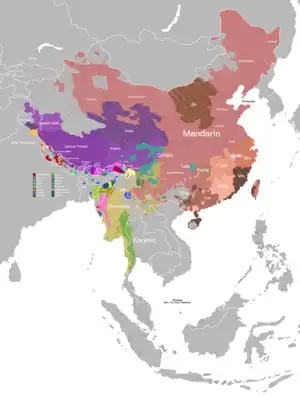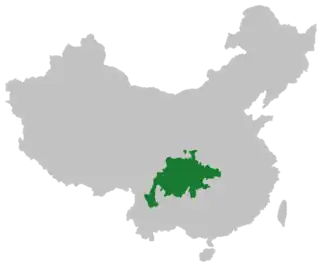| Sichuanese Standard Mandarin | |
|---|---|
| 四川普通话 | |
| Native to | China |
| Region | Sichuan and Chongqing |
Native speakers | None |
Sino-Tibetan
| |
| Language codes | |
| ISO 639-3 | – |
| Glottolog | None |
Sichuanese Standard Mandarin (simplified Chinese: 四川普通话; traditional Chinese: 四川普通話; Sichuanese Pinyin: Si4cuan1 Pu3tong1hua4; pinyin: Sìchuān Pǔtōnghuà), or Szechwanese Standard Mandarin, also known as Pepper Salt Standard Mandarin (simplified Chinese: 椒盐普通话; traditional Chinese: 椒鹽普通話), is a variant of Standard Mandarin derived from the official Standard Mandarin spoken in Sichuanese-speaking areas (mainly Sichuan and Chongqing) in China, and is often called "川普" (Chuan1pu3 or Chuānpǔ) for short.
Unlike Sichuanese (or Sichuanese Mandarin), which is a native language spoken in the Sichuan region and differs greatly from Standard Mandarin, Sichuanese Standard Mandarin (or Chuanpu) arose after the Popularize Mandarin Policy was implemented by the Chinese government in 1956 and is in fact Standard Mandarin with a Sichuanese accent and some elements of Sichuanese vocabulary and grammar. In this view, Chuanpu is, to a certain degree, similar to Taiwanese Mandarin and Singaporean Mandarin, which are influenced by Hokkien and other varieties.
Usage
Chuanpu is spoken by Sichuanese people who are required to communicate with people from outside of Sichuan and Chongqing, but who cannot speak authentic Standard Mandarin. Chuanpu is also often used humorously among local people who find it funny. Due to its humorous effect, Chuanpu is occasionally used in local television, broadcasting and popular music, with good results. Chuanpu Waichang (川普歪唱), the music sung in Chuanpu, is very popular in Sichuan and Chongqing and is usually adapted from famous songs.[1][2]
References
- ↑ 袁蕾 (November 11, 2005). "四川话救了一个电台". donews.com. 南方周末. Archived from the original on September 28, 2011. Retrieved July 17, 2010.
- ↑ 陈静 (December 7, 2004). ""川普",文化新势力?". 新华网. 成都晚报. Archived from the original on June 3, 2011. Retrieved July 17, 2010.

